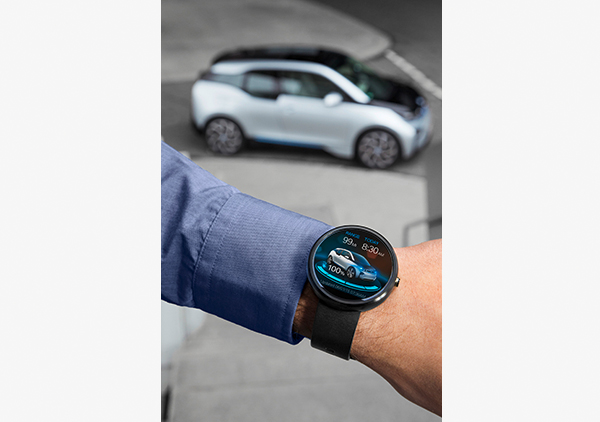 |
|
A car is connected to a smart watch through the BMW i Remote technology. [Photo provided to China Daily] |
Intelligent connected vehicle technology development road map to be released next month
China is about to unfold its road map for intelligent connected vehicle development, in the expectation of regulating and standardizing the burgeoning sector, and helping local car makers and related companies head forward speedily.The Ministry of Industry and Information Technology plans to release an intelligent connected vehicle technology development guidelines next month, a leading official from the minstry said at the Forum on Integration of Auto Industry and Information Communication Technology on Wednesday.
The ministry is also drafting a production standards framework and a committee of experts is being prepared to research and establish the standards for the technology, intelligent assistant, and information security for intelligent connected vehicles, said She Weizhen, director of the equipment industry division at the ministry.
"An immense evolution is coming, we should accelerate developing the technology and transform the industry from big to strong," she said.
Industry insiders say intelligent connected vehicles will have to be able to react on time to changing situations, which involves a vehicle autonomously collecting information via its sensors, rapidly processing it and then issuing instructions for it to act on.
Vehicles will also communicate with the transportation infrastructure to help the car understand the traffic situation and aid traffic control, and China plans to carry out a pilot program in the near future.
"The road map and policies will unify the market and regulate the related sectors," said Zhang Junyi, a partner at Roland Berger Strategy Consultants. "We will see standards with Chinese characteristics, as China won't simply copy those of overseas, and the country will have its say in the global industry."
"The standards may cover vast areas from the definition and design of an intelligent connected car, to the testing and applications," Zhang added.
He said the ministry's actions will support the development of Chinese automakers, as there won't be any grey areas left hindering investors' decision-making.
Currently, Chinese companies have not mastered the core technologies in automotive radar and sensors and the related parts, the majority of the parts and industrial solutions come from European and United States technology companies.
In terms of volume, Robert Bosch GmbH is leading the practical and critical parts sector toward future intelligent mobility, including driving assistance, high-speed adaptive cruise control assistance, and emergency hard braking, according to the German company.
The State Council last year released its "Made-in-China 2025" strategy stating intelligent connected cars are one of the focus industries, and MIIT has been strengthening the top-level design since then.
China Intelligent Transportation Systems Association's president Wu Zhongze sees the development of the intelligent connected car as a way to alleviate the problems of climate change, traffic congestion, and road safety, and he sees it as an inevitable trend in the development of the automobile industry.
After growth in China's auto market-the world's largest-slowed, international car makers have exerted themselves to try and catch the eye's of Chinese customers', especially through the demonstration of vehicle intelligence. The technologies give halo effects to the brands, though they may not be available yet in a brand's mass-produced models, and the Chinese automakers are following the trend.
Chongqing Changan Automobile Co's autonomous driving car travelled about 2,000 kilometers from Chongqing to Beijing in April, and weeks later, LeEco Holdings Ltd unveiled its concept supercar LeSee and demonstrated automatic driving at low speeds and autonomous parking to the media.
One of the nation's leading internet companies Baidu Inc has been working with BMW to expand into the sector based on its mapping data and services, and the two companies conducted their first road test of an autonomous driving car in December.
Ministries are also drafting regulations on the testing of intelligent connected vehicles on public roads, allowing only those products in line with the regulation to conduct highway tests.
An enclosed environment has been created for non-highway tests. The National Intelligent Connected Vehicle Testing Demonstration Base was opened in Shanghai in June, and the national-level base is expected to facilitate research and development, standards studies and policy formulation, besides testing the technology.
"The current road tests were rolled out in the circumstances of no testing rules at all. It is a necessity for the industry to have standards for all to adhere to," Zhang said.
MIIT has progressively participated in the related global regulations and standards being established through the United Nations Forum for Harmonization of Vehicle Regulations, and the Automotive Branch of the China Standardization Association and ministries have held international forums to discuss the standards and regulations on intelligent connected vehicle technology this year and last year.
